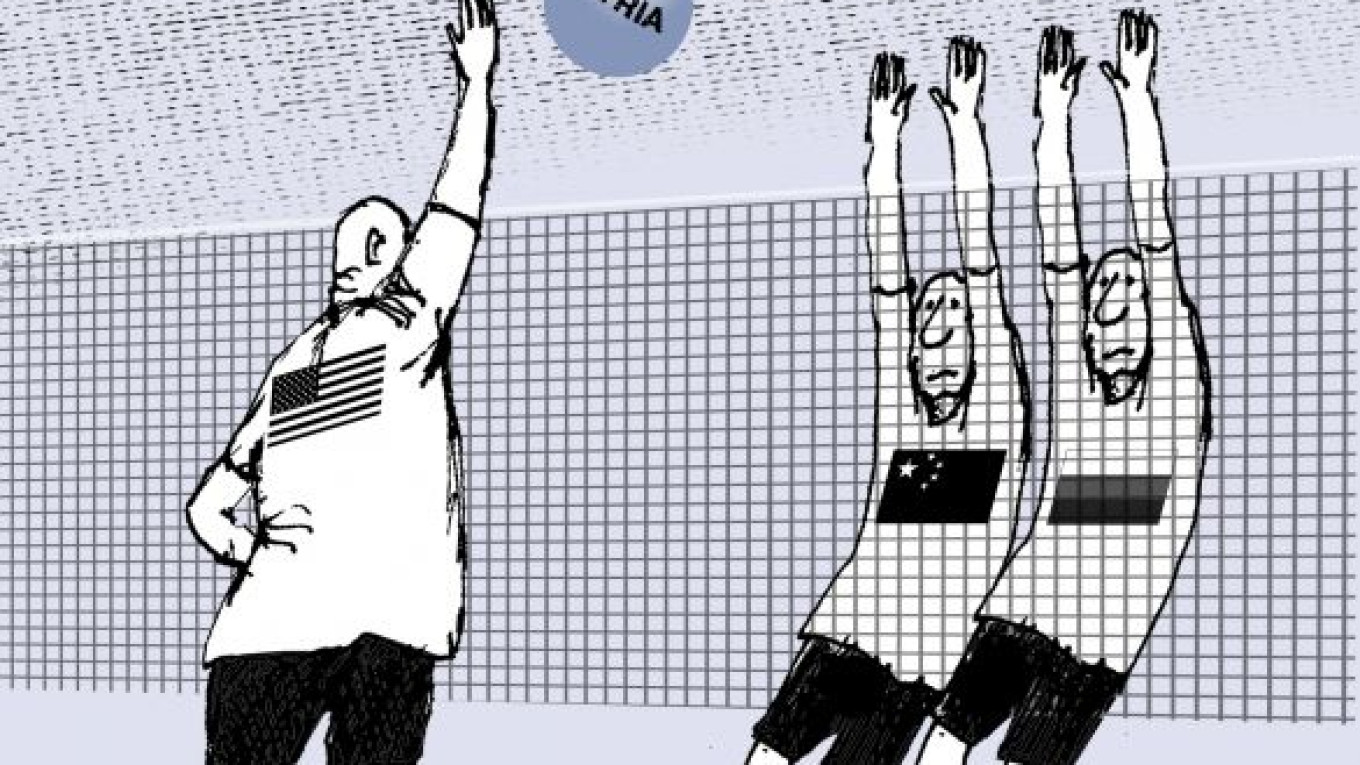As the violent standoff between Syria's security forces and armed opposition groups roils the country, the crisis has opened heated divisions at the United Nations Security Council. Western powers, backed by the Arab League, pressed last week for the adoption of a Security Council resolution that demanded Syrian President Bashar Assad step down. A watered-down version of this resolution was vetoed by Russia and China— both contending that the Security Council must not abandon neutrality by siding with one party to a conflict — that is, the Syrian rebels.
Since then, Western politicians and human rights organizations have been painting Moscow and Beijing as "disgusting" accomplices to Assad's brutal "killing machine." This narrative expects independent great powers like Russia to deny the obvious reality that an armed insurrection aided by foreign powers is plunging Syria into greater turmoil. Russia's ambassador to the UN, Vitaly Churkin, repeatedly criticized the lack of "balance" and the "one-sided" nature of the Security Council resolution. His language needs to be carefully understood.
The Arab League's member states baying for Assad's downfall include harsh dictatorships like Saudi Arabia and softer ones like Qatar and Morocco. They would not be far behind Assad's police state in a morality competition. Those who berate Russia for being an openly acknowledged supplier of weapons to the Assad regime ignore the fact that the rebel Free Syrian Army is being clandestinely armed and financed by the authoritarian Arab League members.
The Arab League publicly touts a nonmilitary solution at the UN, but it is adding fuel to the fire on the ground in Syria. Riyadh and Doha carry the Western mantle in Syria to unhinge Damascus from Iran's sphere of influence. The Free Syrian Army is detaining Iranian agents operating inside Syria, and Iran's Revolutionary Guards, in turn, are assisting the Assad government in techniques of controlling public protests.
Although the real issue at stake is dynastic rule of the Assads, the situation has degenerated into a proxy war. In the past, the Arab League contained diehard supporters of Assad such as Algeria, Lebanon and Iraq, but this fundamentally flawed grouping is now tilting more toward the Western agenda of toppling Assad to weaken Iran.
Four decades is an unacceptably long period for the Assad dynasty to lord over the Syrian people, but the chances of democratization through indigenous struggle are being scuppered by naked power politics of foreign stakeholders. With Russia and China exercising vetoes for a second time on Syria in the Security Council, a Western-endorsed shadowy Saudi-Qatar invasion to dethrone Assad and a tit-for-tat Iranian repulsion are on the cards.
French President Nicolas Sarkozy has hinted at a UN-circumventing coalition of the willing when he announced that European and Arab allies are putting in place a Group of Friends for the Syrian People. This group will presumably intensify the militarization of Syria by aiding the Free Syrian Army more aggressively with the aim of tilting the balance against Assad's regime.
Resolving the Syrian crisis needs an Iran-Saudi Arabian modus vivendi to avoid going down such a disastrous path. Russia and a regional peace broker like Turkey could offer their good offices toward a constructive Syrian endgame whereby Tehran and Riyadh step back from arming different sides.
Members of the Security Council, which voted in favor of the botched resolution last weekend, also need to rethink their limited conception of a regional institution to steer Syria toward democracy. They should look beyond the heavily compromised Arab League and prevent a partisan result in Syria that serves Saudi or Western interests and traps Syrian people between the jaws of an expanded war.
Averting an imbalanced finale in Syria is the geostrategic objective motivating Russia's stance. Crude portrayals of the Russian position — that it is driven by calculations of revenue from arms sales to the Syrian government — gloss over the big picture. Syria is now a laboratory for testing the advent of a multipolar world with broad balance of power in international institutions like the UN and in the Middle East region.
The real "travesty" — U.S. Secretary of State Hillary Clinton's term to attack the Russian and Chinese vetoes — is the camouflaging of ulterior objectives like cornering Iran in the name of human rights of Syrian citizens. The timing and nature of the end of Assad dynasty rule should remain in the hands of Syrian people alone, but they can freely determine their political destiny only when vested international actors cease playing favorites and back off.
Sreeram Chaulia is vice dean of the Jindal School of International Affairs in Sonipat, India, and author of "International Organizations and Civilian Protection: Power, Ideas and Humanitarian Aid in Conflict Zones."
A Message from The Moscow Times:
Dear readers,
We are facing unprecedented challenges. Russia's Prosecutor General's Office has designated The Moscow Times as an "undesirable" organization, criminalizing our work and putting our staff at risk of prosecution. This follows our earlier unjust labeling as a "foreign agent."
These actions are direct attempts to silence independent journalism in Russia. The authorities claim our work "discredits the decisions of the Russian leadership." We see things differently: we strive to provide accurate, unbiased reporting on Russia.
We, the journalists of The Moscow Times, refuse to be silenced. But to continue our work, we need your help.
Your support, no matter how small, makes a world of difference. If you can, please support us monthly starting from just $2. It's quick to set up, and every contribution makes a significant impact.
By supporting The Moscow Times, you're defending open, independent journalism in the face of repression. Thank you for standing with us.
Remind me later.


